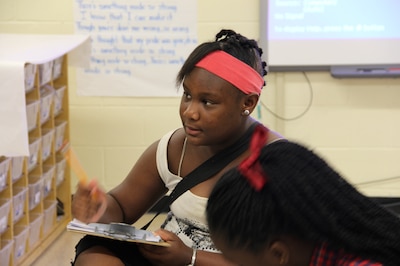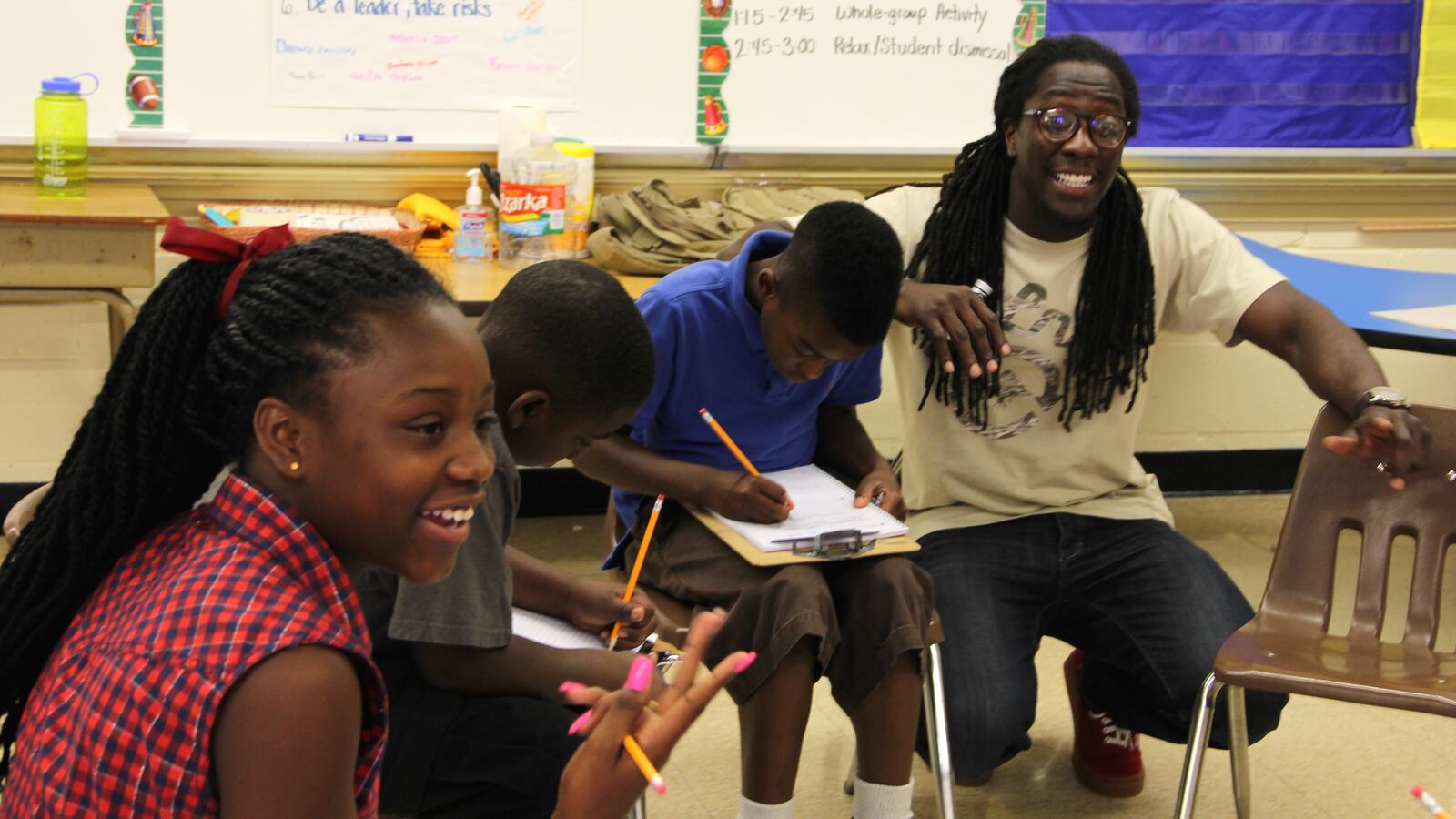On a summer morning at Frayser Achievement Elementary School in Memphis, five students sat in a tight circle and retraced their family roots. Earlier in the week, the children had read “This is the Rope,” a book about a rope that travels from generation to generation and symbolizes a family’s connection. Now they were doing it themselves.
Such activities are 11-year-old Mykenzee Jones’ favorite part of Freedom School, a five-week summer program designed to improve students’ reading skills while also helping them appreciate their cultural roots and community history.
“Freedom Schools taught me when I learn, I can have fun with it,” Mykenzee said while drawing her own family tree. “It made me a better reader because I can understand things. When I read, if I have a problem with a word and I don’t know it, I can always ask.”
A project of the nonprofit Children’s Defense Fund, Freedom Schools are modeled after the original Freedom Schools of 1964, when college students from across the nation invested a summer in Mississippi to teach black adults and children how to read and to help black adults register to vote. Now, more than 5o years later, literacy remains a primary focus of the program, which was resurrected in 1995 and is offered free to participants, most of whom come from low-income families.
Freedom Schools operate in 107 cities and 28 states. Tennessee has five programs in Memphis and Nashville.
All schools follow the same basic structure. The day starts with “Harambee,” where students and instructors sing and dance in the Swahili tradition of “pulling together.” That’s followed with reading activities, games or field trips to places such as public libraries or the Memphis Zoo.
The integrated reading curriculum is the backbone of the program and is taught by mostly college students, known as “servant leaders.” It includes thousands of books that teach the children “to love to read” while also learning about their culture and history, said Kim Robinson, the program manager of the Southern regional office in Jackson, Miss.
Curriculum and staff training are provided by the Children’s Defense Fund, leaving each site to secure its own operational funding. Each school typically serves between 50 and 100 children. A school serving 100 children generally costs $109,000 to operate, including instructional materials, meals, travel and staff salaries.
In Memphis, the state’s Achievement School District sponsors three Freedom Schools at Frayser Elementary, Georgian Hills Elementary and Westside Middle schools — each with roughly 75 students.
While they receive training, instructors have autonomy to get creative with their lessons and in decorating their classrooms with a summer theme. At Frayser Elementary, for instance, one classroom is superhero-themed, and students can wear a cape when they lead discussions.
Mykenzee’s classroom is led by Lozie Guy, a fifth-grade teacher who describes Freedom School as completely different than his work throughout the school year at Frayser Elementary. Freedom’s student-to-teacher ratio, generally 10-to-1, lets him get to know his students better and identify comprehension problems quicker.

“They’re developing a love, you can tell it’s something that hasn’t been developed before,” Guy said. “I like the beauty of it because it allows me as a teacher or an adult to model reading and show it’s not about completion; it’s about understanding and enjoyment.”
Summer reading instruction is crucial for students in this community. At Westside Middle, only 11 percent of students were proficient in reading during the 2013-14 school year. At Georgian Hills and Frayser Elementary, almost 14 and 11 percent, respectively, were proficient. All three schools are part of the state district that takes over failing schools with the ultimate goal of boosting them to the top 25 percent in academic performance.
Nataki Gregory, the state district’s chief academic officer, said Freedom Schools help prevent summer learning loss experienced by many students, especially from low-income families, when they’re out of the classroom for months at a time. “These schools are a critical part of how we make sure students continue to grow in their reading ability,” she said.
Another curriculum component emphasizes cultural history. Students read books about the civil rights movement and regularly discuss social justice with their instructors.
“There’s so much history in Memphis that — opening up the door — they can relate to the music and a lot of things that went on in the civil rights movement,” said Pamela Egwuekwe, a site coordinator at Frayser Elementary. “Those things took place right here in your city, in your own backyard. And they’re still taking place.”
Ultimately, Freedom Schools are designed to equip a new generation of young people to be productive and give back to their own communities.
“It is my hope that (the program) would give them some kind of investment and want to do good — to know that once upon a time, not even 50 years ago, I couldn’t get this same quality of education from anywhere around here — not being black at least,” said Aaron Youngblood, Frayser project director.

